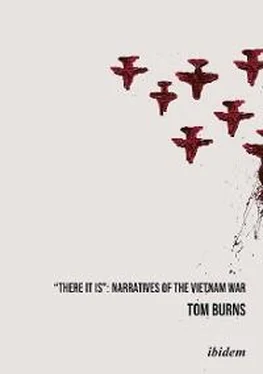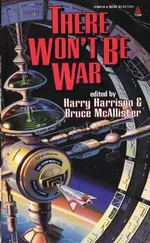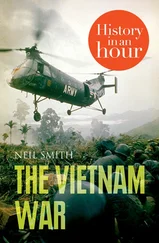Tom Burns - There It Is - Narratives of the Vietnam War
Здесь есть возможность читать онлайн «Tom Burns - There It Is - Narratives of the Vietnam War» — ознакомительный отрывок электронной книги совершенно бесплатно, а после прочтения отрывка купить полную версию. В некоторых случаях можно слушать аудио, скачать через торрент в формате fb2 и присутствует краткое содержание. Жанр: unrecognised, на английском языке. Описание произведения, (предисловие) а так же отзывы посетителей доступны на портале библиотеки ЛибКат.
- Название:There It Is: Narratives of the Vietnam War
- Автор:
- Жанр:
- Год:неизвестен
- ISBN:нет данных
- Рейтинг книги:5 / 5. Голосов: 1
-
Избранное:Добавить в избранное
- Отзывы:
-
Ваша оценка:
- 100
- 1
- 2
- 3
- 4
- 5
There It Is: Narratives of the Vietnam War: краткое содержание, описание и аннотация
Предлагаем к чтению аннотацию, описание, краткое содержание или предисловие (зависит от того, что написал сам автор книги «There It Is: Narratives of the Vietnam War»). Если вы не нашли необходимую информацию о книге — напишите в комментариях, мы постараемся отыскать её.
There It Is: Narratives of the Vietnam War — читать онлайн ознакомительный отрывок
Ниже представлен текст книги, разбитый по страницам. Система сохранения места последней прочитанной страницы, позволяет с удобством читать онлайн бесплатно книгу «There It Is: Narratives of the Vietnam War», без необходимости каждый раз заново искать на чём Вы остановились. Поставьте закладку, и сможете в любой момент перейти на страницу, на которой закончили чтение.
Интервал:
Закладка:
The main example of how a “good” American can be discarded by the system is the story of the Honorable Gilbert MacWhite, who becomes US Ambassador to Sarkhan in 1954, a capable administrator and determined Cold Warrior, who “regarded his anticipated combat with the Communists as the capstone of his career” (81). MacWhite, however, makes several fatal mistakes. He is unable to fathom that the two elderly Chinese servants at the Embassy are Communist spies. When he reports that “the Vietnamese, both Communist and non-Communist, hated the French” as exploitative colonialists (hardly news to any outside observer, it would seem), the duped Senator Brown claims “from first-hand knowledge” that he must be in error.
MacWhite receives a letter from the Secretary of State, who personally likes him, listing his diplomatic mistakes (i.e. everything, according to the authors, that he did right in Sarkhan) and hinting that he resign. MacWhite replies with a longer letter in which he informs the Secretary why the US is not winning hearts and minds in Asia:
I do not think the Russians will ever resort to thermonuclear warfare. They won’t have to. They are winning much too easily to run the risk of annihilation by retaliation…the Russians will win the world by their successes in a multitude of tiny battles…[and] the sum of these battles will decide whether our way of life is to perish or to persist (225).
This is an example of the sort of reasoning that ensured that Americans would take up the cudgel in Vietnam.
In the authors’ view, the “ugly Americans” are those people who are totally unprepared for their mission abroad, unlike the Russians, as MacWhite points out in his letter, who are doing everything right. The Americans know nothing of the countries that they are sent to and, since they do not learn the native language, they are unable to read the local newspapers and can communicate only with the English-speaking elite. They isolate themselves in the “golden ghetto” of privilege, hang out at the “Press Club or the American Club or at the Officer’s Club” and in their ignorance of how people really think are incapable of representing the best interests of the United States—all valid criticisms.
In an interview, a Burmese journalist who apparently represents the authors’ viewpoint succinctly defines the “ugly American” even while insisting that he admires the Americans he meets in the United States: “A mysterious change seems to come over Americans when they go to a foreign land. They isolate themselves socially. They live pretentiously. They’re loud and ostentatious” (123). The problem is shown to begin with the civilian personnel that the State Department recruits to work abroad. As MacWhite complains, the emphasis in recruiting people for the Foreign Service is on good salaries and favorable exchange rates, commissary privileges, free housing, government vehicles, and native servants. Rather, he thinks, candidates should show a willingness to face challenges, work long hours, make sacrifices, live in modest housing, eat native food, read Marx, Lenin, and Mao (i.e. the know-your-enemy strategy), give up private automobiles, and learn difficult languages. Is it any wonder, MacWhite asks, rather redundantly, that we attract only mediocrities?
Such people include both MacWhite’s predecessor and his successor as ambassador to Sarkhan. Louis Sears, his predecessor, is a political party man and appointee who is just putting in time at the post until he can secure a tenured federal judgeship. Sears is a man who knows nothing of the country to which he is ambassador and cares even less. He calls the Sarkhanese “monkeys” and, unable to recognize a dedicated American, believes in the set-up that the Communists arranged for John Colvin and has him sent home. His successor is Joe Bing, the Ugly American made visible: a fat, brassy, glad-handing public-relations type who “knows everybody”—except the nationals.
Not only are civilians members of the wrong type. Captain Boning ( sic ) of the US Navy, is another example. He is part of the American Delegation to an Asian conference on arms, which will decide which American arms should be distributed and to whom. The conference leader Solomon Asch has experience as a tough labor-negotiator, but even he cannot prevent Boning, their technical expert, from dozing off at meetings and not being sufficiently prepared to come up with fast, accurate answers for the Asian delegates. Boning has also been set up, going out with an attractive Chinese doctor every night, a lapse that causes the conference to flounder. This is meant to be an example of the lack of professionalism that the Russians, far more serious and effective in their diplomacy, successfully avoid.
Colonel Hillandale (based on Landsdale) is one of the “good” Americans in the novel, but also a fantastic caricature of Landsdale in the Philippines. Hillandale is a palm-reading “six-foot Swami from Savannah,” and a harmonica-playing “Ragtime Kid,” “one of those happy, uninhibited people who can dance and drink all night and then show up at eight fresh and rested” (92). He can “jam” with an orchestra on his harmonica, “improvising Satchmo himself” ( sic ) and shows his democratic spirit by eating in little Filipino restaurants. He also studies Tagalog at the university in his spare time, and is popular with politicians, including soon-to-be President Magsaysay, as well as taxi-drivers and bandleaders. Only the counselor at the American Embassy refuses to be overwhelmed by his talents and charm.
John Clark Pratt, taking note of Lederer and Burdick’s caricature-like portrait, believes that Hillendale is “one of the inept, short-sighted Americans” in the novel, which may suggest that he is one of the “Ugly Americans” that I have described above. 66From the point of view of Lederer and Burdick, however, Hillendale shares more features with the other so-called “good” Americans of the novel: he is sympathetic to the natives, antipathetic to the bureaucrats, and generally effective in handling difficult situations. Internal evidence in fact shows that he is supposed to be one of the good guys: MacWhite’s letter to the Secretary of State lists only five men out of the “three hundred” Americans who have passed through the Embassy in some capacity: “One of them was a Catholic priest, one was an engineer, one an Air Force Colonel, one a Major from Texas, and one a private citizen who manufactures powdered milk,” namely, Father Finian, Homer Atkins, Colonel Hillendale, Major Kolchek, and John Colvin, respectively.
To ensure support for Magsaysay in the upcoming election, Hillandale goes alone on a motorcycle to a province where “the Communist propagandists had done too good a job” (93). By playing favorite Filipino tunes on his harmonica, he attracts a crowd that he encourages to “sing along,” and talks about the cost of living in America, managing to convince this potentially hostile crowd that not all Americans are rich. The reader is asked to believe that in a single afternoon, this simpático American is so successful at overriding Communist propaganda that 95% of the people of the province turn out to vote for Magsaysay and his pro-American platform.
In the second episode in which Hillandale is involved, he is equally imaginative but less successful. On loan from the Filipinos to Sarkhan, he is invited to the Philippine Ambassador’s dinner party in “Haidho,” the Sarkhanese capital, where he is asked by the ambassador to entertain the guests by reading their palms while the chef makes his final preparations. George Swift, the American chargé d’affairs , is contemptuous and sarcastic about “vaudeville tricks” (he means parlor tricks) at a diplomatic reception, but Hillandale shuts him up by revealing some embarrassing things about his past. The Prime Minister, impressed by this exhibition, asks to have his own palm read in private, which is to be done a day or two after the proper protocol has been observed. Swift, who is responsible for this contact, simply ignores it and thereby insults the Filipinos and causes Hillandale to lose an opportunity to tell the King that the “stars” (Hillandale can also do astrological charts) have advised troops be sent on maneuvers to the northern border, where Chinese Communist troops have massed.
Читать дальшеИнтервал:
Закладка:
Похожие книги на «There It Is: Narratives of the Vietnam War»
Представляем Вашему вниманию похожие книги на «There It Is: Narratives of the Vietnam War» списком для выбора. Мы отобрали схожую по названию и смыслу литературу в надежде предоставить читателям больше вариантов отыскать новые, интересные, ещё непрочитанные произведения.
Обсуждение, отзывы о книге «There It Is: Narratives of the Vietnam War» и просто собственные мнения читателей. Оставьте ваши комментарии, напишите, что Вы думаете о произведении, его смысле или главных героях. Укажите что конкретно понравилось, а что нет, и почему Вы так считаете.












